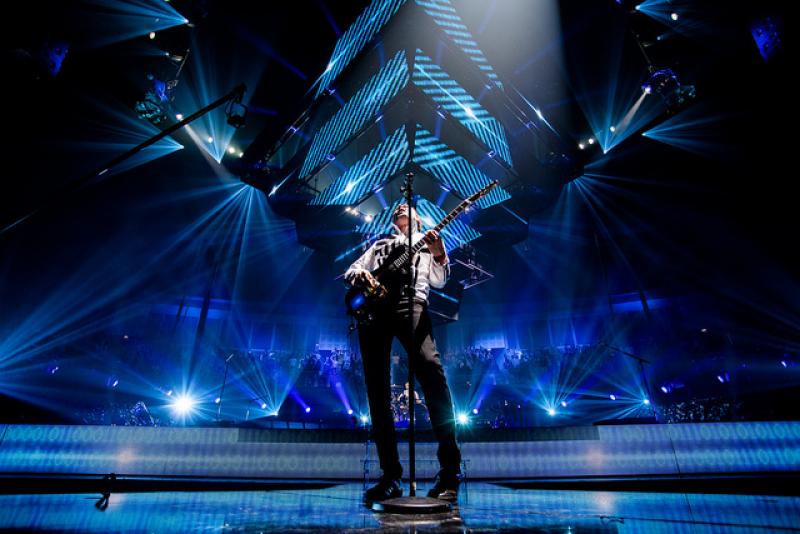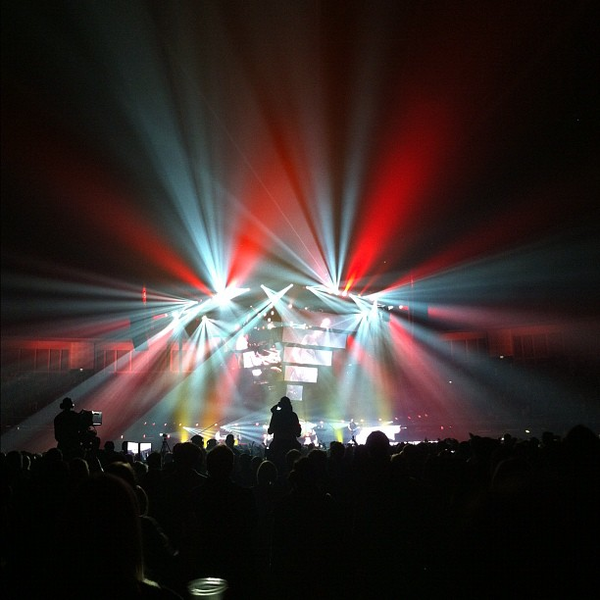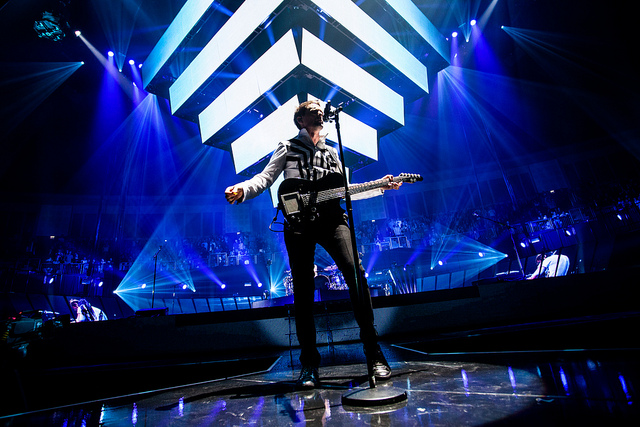Muse, O2 Arena | reviews, news & interviews
Muse, O2 Arena
Muse, O2 Arena
The 21st-century stadium rockers are not cool at all - but they're mindboggingly good at what they do

Muse are not cool. For a minute on leaving the tube station I did think they'd broadened their appeal quite dramatically before realising that a fair section of the people around me were heading to Giants of Lovers Rock show also at the O2 complex last night.
This isn't meant pejoratively, not at all. It's just that compared to their more dour musical cousins Radiohead, or hipper, younger bands, Muse are never taken seriously, never given that cachet of being more than just a rock band. And it has to be said that this is quite understandable when you see them in action. From the moment they took the stage, red lights strobing through the crowd, screens flickering with dystopian imagery, totalitarian prog-rock chords blaring, they were deeply silly.
 “Welcome to the technological paradise,” said a wilfully synthetic female voiceover as part of the intro; this was clearly intended satirically, but the irony was clanging, because from the stupendously big dubstep-rock riffs that immediately followed onwards, Muse served as a brilliant advert for the late capitalist technological overload that their whole output has been dedicated to raising alarms about. Indeed, had a 1980s science fiction visionary had the will and resources to create a 21st-century band, Muse would have been the result – the ideal house band for a Blade Runner show.
“Welcome to the technological paradise,” said a wilfully synthetic female voiceover as part of the intro; this was clearly intended satirically, but the irony was clanging, because from the stupendously big dubstep-rock riffs that immediately followed onwards, Muse served as a brilliant advert for the late capitalist technological overload that their whole output has been dedicated to raising alarms about. Indeed, had a 1980s science fiction visionary had the will and resources to create a 21st-century band, Muse would have been the result – the ideal house band for a Blade Runner show.
There was even something android-like about the band's leader Matt Bellamy as they plunged in to new album opener “Supremacy”. Looking down from the Arena's seats, it became clear how perfectly sculpted he is to be at the heart of a light show. The curiously gelled hair which he has always rocked exactly set off his angular face and patterened suit, and made him an automatic focus among the dancing spotlights. His wailing voice, too, which was often barely distinguishable from his guitar tone, had something of the cyborg about it. His robo-rockstar act was all the odder given the ordinariness of his bandmates, Chris Wolstenholme in plain white T-shirt and Dom Howard looking not unlike Super Hans from Peep Show.
 Then, after a deftly delivered coda of Led Zeppelin showboating, the mothership came down. A huge scaffold of screens in various pyramid and inverted pyramid form hovered over the stage, and the barrage of images started. Again, it was a 1980s vision of the future, rendered futuristically: incredible detail, mindblowing complexity, but somehow Max Headroom-ish. But then, everything about Muse borrows from the past shamelessly but brilliantly: glaring chunks of both “Don't Stop Me Now” and “Bohemian Rhapsody” in “Explorers”, bits of Chili Peppers funk-rock in “Supermassive Black Hole” and “Panic Station”, the complete works of Vince Clarke in “Undisclosed Desires”, all twisted into something unmistakeably Muse.
Then, after a deftly delivered coda of Led Zeppelin showboating, the mothership came down. A huge scaffold of screens in various pyramid and inverted pyramid form hovered over the stage, and the barrage of images started. Again, it was a 1980s vision of the future, rendered futuristically: incredible detail, mindblowing complexity, but somehow Max Headroom-ish. But then, everything about Muse borrows from the past shamelessly but brilliantly: glaring chunks of both “Don't Stop Me Now” and “Bohemian Rhapsody” in “Explorers”, bits of Chili Peppers funk-rock in “Supermassive Black Hole” and “Panic Station”, the complete works of Vince Clarke in “Undisclosed Desires”, all twisted into something unmistakeably Muse.
Through all this, the visuals flashing across the screens told us in no uncertain terms: bankers are bad, yeah. The world is in crisis, yeah? Encroaching chaos, yeah? Technology is a threat, yeah? There's a lot of surveillance, yeah? But it made it all look fun, just as Bellamy's lyrical vision has always made paranoia, existential vertigo and societal meltdown sound exciting. Muse are the ultimate Hollywood blockbuster band, the Society of the Spectacle made flesh, so when 50,000 people bellowed along with “Knights of Cydonia” “we will fight for our rights”, it was questionable whether they really cared about the erosion of their own rights to living wages and universal healthcare any more than sympathising with the Rebel Alliance in Star Wars makes someone into an anti-establishment firebrand, but my God it looked and sounded impressive. So no, not cool, not cool at all, but as an exemplary expression of everything they rail against, Muse are mindbogglingly good.
Add comment
The future of Arts Journalism
You can stop theartsdesk.com closing!
We urgently need financing to survive. Our fundraising drive has thus far raised £49,000 but we need to reach £100,000 or we will be forced to close. Please contribute here: https://gofund.me/c3f6033d
And if you can forward this information to anyone who might assist, we’d be grateful.

Subscribe to theartsdesk.com
Thank you for continuing to read our work on theartsdesk.com. For unlimited access to every article in its entirety, including our archive of more than 15,000 pieces, we're asking for £5 per month or £40 per year. We feel it's a very good deal, and hope you do too.
To take a subscription now simply click here.
And if you're looking for that extra gift for a friend or family member, why not treat them to a theartsdesk.com gift subscription?
more New music
 Soulwax’s 'All Systems Are Lying' lays down some tasty yet gritty electro-pop
Belgian dancefloor veterans return to the fray with a dark, pop-orientated sound
Soulwax’s 'All Systems Are Lying' lays down some tasty yet gritty electro-pop
Belgian dancefloor veterans return to the fray with a dark, pop-orientated sound
 Music Reissues Weekly: Marc and the Mambas - Three Black Nights Of Little Black Bites
When Marc Almond took time out from Soft Cell
Music Reissues Weekly: Marc and the Mambas - Three Black Nights Of Little Black Bites
When Marc Almond took time out from Soft Cell
 Album: Mobb Deep - Infinite
A solid tribute to a legendary history
Album: Mobb Deep - Infinite
A solid tribute to a legendary history
 Album: Boz Scaggs - Detour
Smooth and soulful standards from an old pro
Album: Boz Scaggs - Detour
Smooth and soulful standards from an old pro
 Emily A. Sprague realises a Japanese dream on 'Cloud Time'
A set of live improvisations that drift in and out of real beauty
Emily A. Sprague realises a Japanese dream on 'Cloud Time'
A set of live improvisations that drift in and out of real beauty
 Trio Da Kali, Milton Court review - Mali masters make the ancient new
Three supreme musicians from Bamako in transcendent mood
Trio Da Kali, Milton Court review - Mali masters make the ancient new
Three supreme musicians from Bamako in transcendent mood
 Hollie Cook's 'Shy Girl' isn't heavyweight but has a summery reggae lilt
Tropical-tinted downtempo pop that's likeable if uneventful
Hollie Cook's 'Shy Girl' isn't heavyweight but has a summery reggae lilt
Tropical-tinted downtempo pop that's likeable if uneventful
 Pop Will Eat Itself's 'Delete Everything' is noisy but patchy
Despite unlovely production, the Eighties/Nineties unit retain rowdy ebullience
Pop Will Eat Itself's 'Delete Everything' is noisy but patchy
Despite unlovely production, the Eighties/Nineties unit retain rowdy ebullience
 Music Reissues Weekly: The Earlies - These Were The Earlies
Lancashire and Texas unite to fashion a 2004 landmark of modern psychedelia
Music Reissues Weekly: The Earlies - These Were The Earlies
Lancashire and Texas unite to fashion a 2004 landmark of modern psychedelia
 Odd times and clunking lines in 'The Life of a Showgirl' for Taylor Swift
A record this weird should be more interesting, surely
Odd times and clunking lines in 'The Life of a Showgirl' for Taylor Swift
A record this weird should be more interesting, surely
 Waylon Jennings' 'Songbird' raises this country great from the grave
The first of a trove of posthumous recordings from the 1970s and early 1980s
Waylon Jennings' 'Songbird' raises this country great from the grave
The first of a trove of posthumous recordings from the 1970s and early 1980s

Comments
I'm sorry but you have no
All kinds of middle-class
Thanks for the correction
Thanks for the correction Alex - but I am well aware of the theme of The 2nd Law, hence the mention of "encroaching chaos" in the final paragraph. I see that theme as an extension of Bellamy's fascination with catastrophe, societal collapse and so on, which has been present throughout the band's career. My mis-hearing of that voiceover doesn't alter that point.
I didn't say anything about age groups except a passing mention of "indie kids" which is a generic term. You're right, there was a broad cross-section of ages though, including parents and teenagers both obviously there to see the band - though it was very much dominated by 20- and early 30-somethings.
Not sure which segment of the
OK, 20,000. But that is
OK, 20,000. But that is nitpicking, it was still a lot of people bellowing (admittedly tunefully), so again my point still stands. Not sure where you get that I love V Festival from, though. And I think you mean ELUSIVE. n.b. at no point do I suggest that being either "cool" or "uncool" is a particularly desirable thing: just that it's a defining factor of Muse that they exist outside the cycles of hipness and fashionability - they are big, brash mainstream entertainment, showbiz to the bone, and more power to them for that.
Muse is mindblowing awful.
Thanks for taking the time
Thanks for taking the time and effort to share that.
I don't believe you saw the
Thought that this was a
I'm 56 been going to rock
Ah Muse: the reviewer's bete